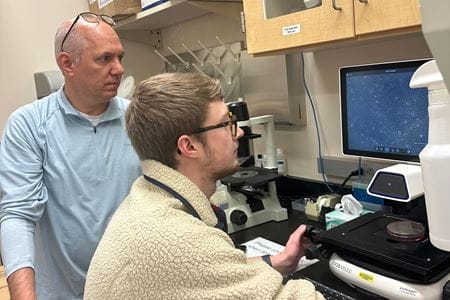INDIANAPOLIS — New research by a team of Indiana University School of Medicine scientists and their collaborators has uncovered a novel vulnerability in prostate cancer animal models that starves prostate tumors of critical nutrients and stunts their growth, which could lead to the development of new treatments for the deadly disease.
Led by IU School of Medicine's Kirk Staschke, PhD, assistant research professor of biochemistry and molecular biology, and Ronald C. Wek, PhD, Showalter Professor of Biochemistry, the study was recently published in Science Signaling.
Prostate cancer is a leading cause of cancer deaths in American men. Current treatments target the hormone testosterone, which prostate cancer cells need to grow. Unfortunately, prostate tumors frequently become resistant to these treatments, leaving doctors with few options to stop the disease.
The research team discovered a promising new way to target prostate tumors by starving them of critical nutrients called amino acids. Like other tumors, prostate cancer cells need a lot of nutrients to support their rapid growth. As nutrients are depleted, a protein called GCN2 signals the cells to make more fuel for growth. The team reasoned that a drug that shuts GCN2 down would render the cancer unable to make enough fuel to survive.
"We were only partially correct," said Staschke, who is also a researcher in the Experimental and Developmental Therapeutics research program at the IU Melvin and Bren Simon Comprehensive Cancer Center. "Inhibiting GCN2 did slow the growth of the tumor cells, but it didn’t kill them. That's when we discovered the cancer has a backup plan."
The team went on to show that a protein called p53 was cancer's "Plan B." The p53, which is functionally retained in most prostate cancers — unlike in other forms of cancer — signals to restrict cell division and gather nutrients. Prostate cancers could be effectively destroyed when the researchers inhibited both GCN2 and p53.
"The current study exploits metabolic vulnerabilities unique to prostate cancer to starve it for essential nutrients and kill these tumor cells," Staschke said.
This research was carried out by graduate students Ricardo Cordova and Noah Sommers in collaboration with Jeffrey Brault, PhD, of IU School of Medicine; Roberto Pili, MD, of the University at Buffalo; and Tracy Anthony, PhD, of Rutgers University. It was supported by the National Institutes of Health, the U.S. Department of Defense, the American Cancer Society and the IU Simon Comprehensive Cancer Center.
About the Indiana University School of Medicine
The IU School of Medicine is the largest medical school in the U.S. and is annually ranked among the top medical schools in the nation by U.S. News & World Report. The school offers high-quality medical education, access to leading medical research and rich campus life in nine Indiana cities, including rural and urban locations consistently recognized for livability. According to the Blue Ridge Institute for Medical Research, the IU School of Medicine ranks No. 13 in 2023 National Institutes of Health funding among all public medical schools in the country.
For more news, visit the IU School of Medicine Newsroom: medicine.iu.edu/news




